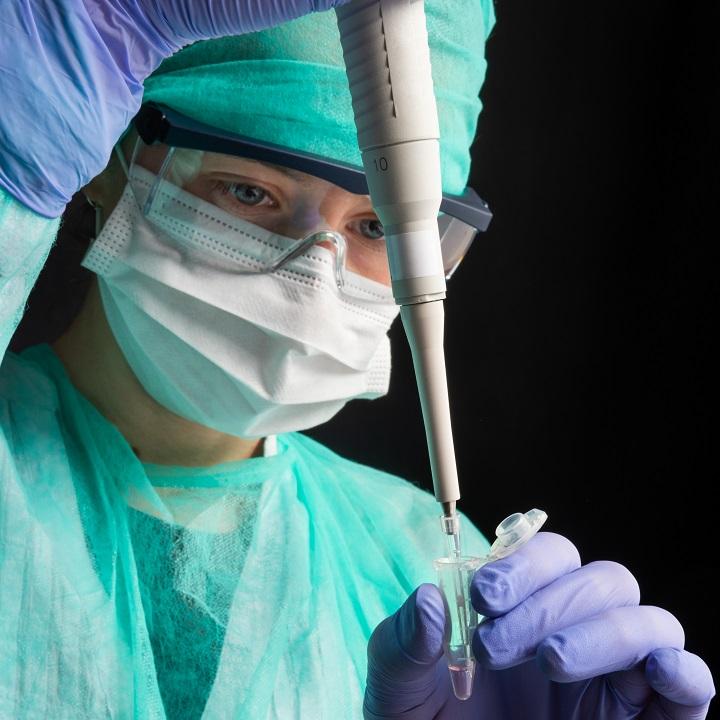IDEXX Reference Laboratories

IDEXX SARS-CoV-2
(COVID-19) RealPCR Test
For rare cases in consultation with your local public health authority
After consultation with the Animal Health Committee and the Australian Veterinary Association, IDEXX has made available to veterinarians the IDEXX SARS-CoV-2 (COVID-19) RealPCR Test for pets. IDEXX’s guidance, aligned with that of medical experts, is that veterinarians only order the IDEXX SARS-CoV-2 (COVID-19) RealPCR Test after consultation with a public health authority (for example, a state public health veterinarian in Australia) and these three specific criteria are met:
- The pet is living in a household with a human who has COVID-19 or has tested positive for virus.
- The pet has already been tested for more common infections, that a veterinarian has ruled out using PCR testing
- The pet (especially cats and ferrets) is showing clinical signs consistent with COVID-19
See additional guidelines for usage and reporting requirements below.
For use in rare cases to confirm or rule out COVID-19 infection in pets
IDEXX is making this test available in response to growing evidence and customer demand that in rare cases pets living with COVID-19 positive humans can be at risk for SARS-CoV-2 infection. It is important to note at this time there is no evidence of pet to human spread of the infection.
Importantly, submitting veterinarians will be asked to complete a pre-test declaration confirming that the above stated criteria apply and that the state or territory based Chief Veterinary Officer has been consulted about the situation.
Moreover, the IDEXX test protocol will involve ongoing liaison with the Australian Centre for Disease Preparedness in Geelong - Victoria, where all suspect positive samples will be sent for confirmatory testing and notification to the relevant state and federal authorities.
Leading health authorities and IDEXX veterinarians agree that transmission of the SARS-CoV-2 virus is primarily person to person and advise against testing asymptomatic pets. In symptomatic pets, it is more likely that disease is caused by a more common respiratory infection than by COVID-19.14
While there is currently no evidence that dogs or cats play a role in transmitting the disease to humans, growing clinical evidence suggest there may be varying levels of susceptibility to infection in animals. Recent peer-reviewed research also showed cats and ferrets may be more susceptible to clinical infections while dogs generally seem more resistant to infection.8-11
When to test
Leading health authorities and IDEXX veterinarians agree that transmission of the SARS-CoV-2 virus is primarily person to person and advise against testing asymptomatic pets. In symptomatic pets, it is more likely that disease is caused by a more common respiratory infection than by COVID-19.14
Testing will only be performed when the submitting veterinarian has completed a declaration form stating that a previous investigation has been completed (to rule-out common veterinary pathogens), the patient is displaying clinical signs and the patient is from a household impacted by COVID-19.
N.B. Testing to rule out other common veterinary pathogens must have been completed within the last 7 days and a copy of the results must be supplied in the event the testing was not performed at IDEXX.
For more detailed information, please see our diagnostic update.
IDEXX wholly endorses the recommendation of the American Veterinary Medical Association (AVMA) found on their website that states, ‘If a new, concerning illness is observed that cannot be otherwise explained, and the companion animal has had close and prolonged contact with a person with confirmed or suspected COVID-19 infection, the veterinarian should contact a state public health veterinarian or designated health official to discuss whether or not there is a need to test that animal for COVID-19.’
How to order
Special instructions for submitting specimens for the IDEXX SARS-CoV-2 (COVID-19) RealPCR Test
All IDEXX SARS- CoV2 (COVID-19) RealPCR Test specimens should be submitted to the IDEXX Laboratory using the current courier arrangements specific for your clinic.
Shipping supplies and PCR swabs for COVID-19 testing are available via IDEXX Online Orders (https://order.idexx.com.au).
Note: For specifics on the sample submission process for your clinic, please contact IDEXX on 1300 44 33 99 or email IDEXX-ANZ-Customer-Service@idexx.com.
Not an IDEXX customer? Please contact us via IDEXX-ANZ-Sales@idexx.com and a Diagnostic Practice Consultant will be in touch to assist in setting up an account.
Test names and codes
Test code: COVID |
IDEXX SARS-CoV-2 (COVID-19) RealPCR Test |
Test for more common causes of respiratory illness to be considered prior to testing for SARs-CoV-2 (COVID-19)
Feline Upper Respiratory Profile (RealPCR Panel)
Chlamydia felis, Feline Calicivirus FCV, Feline Herpesvirus 1 FHV-1 (quantitative), Mycoplasma felis, Bordetella bronchiseptica
| Test code: FUR |
Canine Respiratory Profile (RealPCR Panel)
Canine Adenovirus Type 2, Canine Distemper Virus CDV (quantitative), Canine Herpesvirus CHV-1, Canine Parainfluenza Virus, Canine Influenza Virus, Canine Respiratory Coronavirus, Mycoplasma cynos, Bordetella bronchiseptica
| Test code: CRS |
Specimen submission guidelines
SARS-CoV-2 specimen collection guidelines
Personal Protective Equipment is recommended when collecting samples.
Our existing shipping material is in line with UN3373 and therefore the current recommendations of the WHO.
We do recommend disinfecting the outside of the submission bag as an added precaution, but no special labelling is required.
Specimen requirements
- 2 x deep pharyngeal swab (with visible organic material on swab; please rub firmly) and
- 2 x conjunctival swab (wipe eye clean, swab inside of eyelid).
- +/- 3-5g (1g minimum) fresh faeces in a sterile container
- +/- a deep nasal swab if possible (if the patient is co-operative)
Please submit dry, plastic-stemmed swabs, without transport media; keep refrigerated. Appropriate PPE should be worn when collecting samples.
Reporting requirements
What are the reporting requirements for a positive IDEXX SARS-CoV-2 (COVID-19) RealPCR Test?
COVID-19 is an internationally reportable disease. If a positive SARS-CoV-2 result is detected, the IDEXX RealPCR team will provide essential information as required by applicable law with public health and/or veterinary authorities (for example, to the Chief Veterinary Officer for your state or territory). The submitting veterinarian is also responsible to report the positive result and plays a critical role in providing the additional clinical details and history about the patient. Positive IDEXX SARS-CoV-2 (COVID-19) RealPCR tests will be further confirmed at a third-party government laboratory, according to regulatory guidance.
Support and resources
Ordering Options
You can order the test code on the paper submission form manually or order the test via vetconnectplus.com.au.
Turnaround time
Negative results in 2-3 days; allow additional time for confirmation of SARS-CoV-2 PCR positive results
Customer support services
IDEXX supports your practice with our customer support, technical support and medical consulting services team, including our diagnostic support veterinarians and board-certified specialists.
1300 44 33 99

What is PCR?
Polymerase chain reaction (PCR) testing identifies the presence of a pathogen’s DNA or RNA in a patient specimen. PCR is highly sensitive and specific testing that can confirm the actual presence of an organism.
PCR results facilitate early detection of disease in sick animals:
- Often positive in infected animals before an antibody can be detected

Additional resources
White paper: Clinical evidence suggesting varying levels of susceptibility to SARS-CoV-2 (COVID-19) virus infection in animals
White paper: IDEXX SARS-CoV-2 (COVID-19) RealPCR Test
Diagnostic resource: Coronavirus diagnostic update, April 2020
Public health and other non-customer inquiries: Click here
References
- Centers for Disease Control and Prevention. Coronavirus Disease 2019 (COVID-19). www.cdc.gov/COVID19. Accessed April 16, 2020.
- World Health Organization. Coronavirus disease (COVID-19) outbreak. www.who.int/emergencies/diseases/novel-coronavirus-2019. Accessed April 16, 2020.
- American Veterinary Medical Association. COVID-19: What veterinarians need to know. www.avma.org/coronavirus. Accessed April 16, 2020.
- World Small Animal Veterinary Association (WSAVA). The new coronavirus and companion animals—advice for WSAVA members. www.wsava.org/news/highlighted-news/the-new-coronavirus-and-companion-animals-advice-for-wsava-members. Accessed April 16, 2020.
- Ong SWX, Tan YK, Chia PY, et al. Air, surface environmental, and personal protective equipment contamination by serve acute respiratory syndrome coronavirus 2 (SARS-CoV-2) from a symptomatic patient [published online ahead of print March 4, 2020]. JAMA. 2020;e203227. doi:10.1001/jama.2020.3227
- van Doremalen N, Bushmaker Y, Morris DH, et al. Aerosol and surface stability of SARS-COV-2 as compared with SARS-CoV-1. N Engl J Med. 2020;382(16):1564–1567. doi:10.1056/NEJMc2004973
- Wan Y, Shang J, Graham R, Baric RS, Li F. Receptor recognition by the novel coronavirus from Wuhan: An analysis based on decade-long structural studies of SARS coronavirus. J Virol. 2020;94(7):e00127-20. doi:10.1128/JVI.00127-20
- Shi J, Wen Z, Zhong G, et al. Susceptibility of ferrets, cats, dogs and other domesticated animals to SARS-coronavirus 2. Science. 2020;eabb7015. doi:10.1126/science.abb7015
- Kim Y, Kim SG, Kim SM, et al. Infection and rapid transmission of SARS-CoV-2 in ferrets [published online ahead of print April 5, 2020]. Cell Host Microbe. 2020;S1931-3128(20)30187-6. doi:10.1016/j.chom.2020.03.023
- Questions and answers on the 2019 coronavirus disease (COVID-19): Surveillance and events in animals. World Organisation for Animal Health (OIE) website. www.oie.int/en/scientific-expertise/specific-information-and-recommendations/questions-and-answers-on-2019novel-coronavirus. Updated April 9, 2020. Accessed April 16, 2020.
- USDA Cases of SARS-CoV-2 in Animals in the United States. USDA Animal and Plate Health Inspection Service website. https://www.aphis.usda.gov/aphis/dashboards/tableau/sars-dashboard. Updated February 15, 2021. Accessed March 16, 2021.
- OIE Statement on COVID-19 and Mink. OIE World Organisation for Animal Health website. https://www.oie.int/en/for-the-media/press-releases/detail/article/oie-statement-on-covid-19-and-mink/. Accessed March 16, 2021.
- Low-level of infection with COVID-19 in pet dog [news release]. Hong Kong: Government of the Hong Kong Special Administrative Region; March 4, 2020. www.info.gov.hk/gia/general/202003/04/P2020030400658.htm. Accessed April 16, 2020.
- Journal of Small Animal Practice (2020), 1-7: Frequency of respiratory pathogens and SARS-CoV-2 in canine and feline samples submitted for respiratory testing in early 2020. doi: 10.1111/jsap.13300.
PCR testing is a service performed pursuant to an agreement with Roche Molecular Systems, Inc.